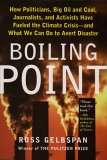Summary | Excerpt | Reviews | Beyond the Book | Readalikes | Genres & Themes | Author Bio
How Politicians, Big Oil and Coal, Journalists and Activists Are Fueling the Climate Crisis--and What We Can Do to Avert Disaster

Critics' Opinion:
Readers' Opinion:
First Published:
Jul 2004, 272 pages
Paperback:
Nov 2005, 304 pages
 Book Reviewed by:
Book Reviewed by:
BookBrowse Review Team
Buy This Book
That plan was drafted with the help and approval, among others, of the Edison Electric Institute, the American Petroleum Institute, and the Southern Company, as well as the National Mining Association, the Portland Cement Association, the American Iron and Steel Institute, the American Chemistry Council, the Aluminum Association, the Association of American Railroads, and the American Forest and Paper Association.
But the sleight-of-hand underlying the plan was immediately obvious to observers. (The 'intensity' of carbon emissions--which is very different from the quantity of carbon emissions--reflects the amount of CO2 emitted per unit of economic output, not the total output of CO2 ). In short order, the Washington-based World Resources Institute pointed out that given the projected increase in the nation's economic output, the Bush plan would still allow greenhouse gas emissions to increase by about 14 percent during the period of the plan--only marginally less than would have been expected in the absence of a mandatory, let alone voluntary, intensity-reduction arrangement.
Europe's anger at the Bush administration's disingenuous and deceptive approach erupted again several months later when Britain's top science adviser launched a public attack on U.S. priorities. In an article in Science, Sir David King pointedly asserted that 'climate change is the most severe problem that we are facing today, more serious even than the threat of terrorism.' In a withering assault, he blasted Bush's 'free-market' approach to emissions reductions, declaring: 'The Bush administration's strategy relies largely on market-based incentives and voluntary action . . . But the market cannot decide that mitigation is necessary, nor can it establish the basic international framework in which all actors can take their place.' Concluded King: 'As the world's only remaining superpower, the United States is accustomed to leading internationally coordinated action. But the U.S. government is failing to take up the challenge of global warming.'
Even as the Bush approach alienated other countries, it also set the federal government against many of the country's states and cities.
In the absence of federal leadership, a number of localities decided to take the first step in addressing the climate crisis, confident that the national government would soon follow suit. But as the Bush administration's antagonism toward this issue became increasingly apparent, a number of states moved the battle from the grass roots into the courts.
Picking up on a voluntary, local approach begun in 1988, more than 110 cities have now joined with the Cities for Climate Protection Campaign of the International Council for Local Environmental Initiatives. More than thirty states have either developed--or are already implementing--programs to reduce their carbon emissions.
In late 2002, the Pew Center for Climate Change reported that more than half the states had enacted mandatory or voluntary plans to reduce emissions. According to a report in the Washington Post that was based on the Pew study, fifteen states, including Texas, have enacted legislation requiring utilities to increase their use of renewable energy sources such as wind power or biomass in generating a portion of their overall electricity.
The Post cited a number of examples, including:
As their frustration with the president intensified, a number of states became more aggressive in their criticisms of the Bush administration and its Environmental Protection Agency for turning their backs on the climate crisis.
From Boiling Point by Ross Gelbspan, pages 93-126 of the hardcover edition. Reprinted with Permission from Basic Books – Copyright 2004.




Never read a book through merely because you have begun it
Click Here to find out who said this, as well as discovering other famous literary quotes!
Your guide toexceptional books
BookBrowse seeks out and recommends the best in contemporary fiction and nonfiction—books that not only engage and entertain but also deepen our understanding of ourselves and the world around us.